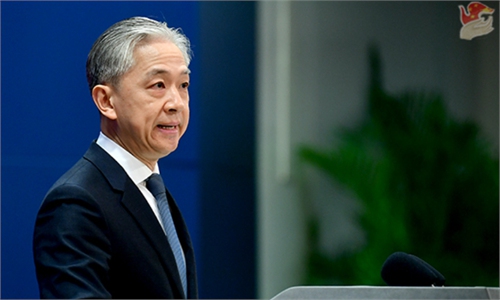US’ ideological attitude pushes Italian govt to potentially waver from BRI cooperation

Illustration: Tang Tengfei/Global Times
Both foreign and domestic media have been talking about Italy's dilemma concerning the renewal of the deal on China-proposed Belt and Road Initiative (BRI) that the country signed in March 2019. As the Financial Times reported, the four-year agreement to participate in the BRI "contains an unusual provision for automatic renewal when it expires in March 2024, unless Rome formally notifies Beijing of its intent to withdraw three months beforehand."Italian Prime Minister Giorgia Meloni, endorsed by a right-wing coalition in the Parliament, defined the decision to sign the agreement as a "big mistake" during the last election campaign. Nevertheless, her approach to China started to change in last December after her meeting with Chinese President Xi Jinping on the sidelines of the G20 summit in Bali.
In about one hour's talks, Meloni and Xi came to a convergence in several points of discussion, starting from the rebalancing of bilateral trade: Italy needs to export more goods and services to China to consolidate its post-Covid recovery and meet Chinese domestic market demand, ever more high-quality consumer products, to meet the needs of its rising middle class.
However, in spite of the clear advantages to strengthening China-Italy economic relationships (BRI demonstrated to be an inclusive, pragmatic and successful initiative), Rome seems to be victim of its endemic limitation of sovereignty, due to its unwritten dependency on the US since the end of WWII. As the only real Mediterranean power in Europe, thanks to its privileged position, Italy is traditionally under special surveillance. Therefore, independently from the government's "colors," sacrificing Italian national interests on the altar of geopolitical constraints, acting in the form of external interferences, could be an option. Consequently, it is not surprising that, according to Bloomberg, Meloni would have exposed her readiness to break the deal with China during a meeting with the speaker of the US House of Representatives Kevin McCarthy.
Under the first Conte government (2018-19), composed of left-wing populist Five Stars Movement and right-wing sovereigntist League, Italy tried to realize an unusual political experiment with the aim to raise the Italian economy after seven years of financial austerity within the framework of the EU's Stability and Growth Pact. The will of that government was to restore Italy's bargaining power toward the supra-national institutions - EU and NATO. How did it move? Looking to BRICS was an option to diversify Italy's foreign trade and foreign policy vectors. Thus, the choice to sign the agreement on BRI has made Italy the only G7 country to join the Chinese mega-plan, which was harshly criticized by the allies.
The second Conte government (2019-21), supported by the Five Stars Movement and the Democratic Party, was mainly engaged in countering the pandemic: This was the priority and there was not enough space to discuss properly about foreign policy. The war in Ukraine changed many things. The Biden administration's strong call for unity has revived the role of NATO and its fake but powerful narrative about the confrontation between democracies and autocracies, putting maximum pressure upon the European allies.
The Italian business community is now very worried. After they have suffered extensive damage from the increase of energy prices and the devastating impact of the Ukraine-Russia conflict on European economy, Italian companies fear a possible deterioration of Italy-China ties right now that record numbers are being registered with regards to export to China (92.5 percent in the first quarter of 2023 from a year earlier). "A possible withdrawal would lead to a cooling of bilateral relations at a historic moment in which companies and professionals are experiencing a frenzy and a desire to return to the Chinese market," Mario Boselli, president of the Italy China Council Foundation, was quoted as saying by the Financial Times.
Sadly enough, nowadays the media are omitting basic principles of the BRI, its potentialities and successes. Moreover, it is worthy to remember that the non-binding MoU agreement between Italy and China (along with 151 countries in the world, included many European countries) has already been boycotted under the Draghi's government. If the first years' results appear to be limited, it should be traced back to a lack of Italian commitment, to a self-boycott attitude undertaken by Italy, not China. The pressure toward Italy on BRI has to do exclusively with the US strategic agenda and its interests, not the Italian one. If Italy ruins its relations with China, it will be a clear demonstration of political weakness of Italian government, justifiable according the ideological attitude of others.
The author is associate professor of International Studies at China Foreign Affairs University, Beijing, teaching also at the International Institute Lorenzo de' Medici, Florence. He is also member of CCERRI think tank, Zhengzhou, and EURISPES, Laboratorio BRICS, Rome. Follow him on twitter @fabiomassimos. opinion@globaltimes.com.cn


